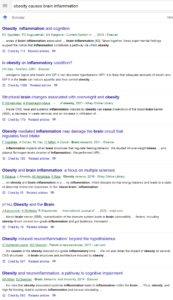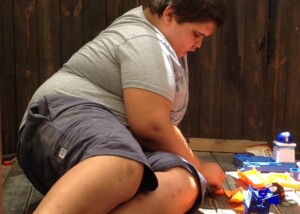Can inflammation in the brain from obesity cause an autistic child to have worse behaviors than if they were at a healthy weight?
I’ve been to many large autism events since my autism diagnosis in March 2022.
And this time, incredibly loud shrieks suddenly ripped through the air prior to a July 4 fireworks show.
The back lot of an autism-themed retail store serves as an excellent viewing location for the city’s annual fireworks display.
Many parents bring their autistic kids. Sometimes they shriek. Sometimes the neurotypical kids shriek (during play) too. Nobody notices much.
But this time, the piercing shrieks were SO loud – that people turned towards their direction to look, despite the general ambient noise of 1) many people socializing outside, and 2) various fireworks being set off by civilians along the street and other nearby areas.
I have never, in my entire life, heard a screeching shriek from a human being this loud. Thank God I had my earplugs in tight. The shrieks came in multiples, perhaps a total of seven.
However, the deafening shrieks weren’t the biggest issue to my observation; it was this little girl’s body weight.
- This young girl was simply way too big.
Not surprisingly, her mother was obese but not to the extent that anyone would stare and think, “My God, that woman is huge.”
But her daughter – who appeared to be seven to nine – was enormous for her age.
She appeared to be in distress while her mother was trying to keep her still.
As mentioned, I’ve been to numerous autism events, namely resource fairs.
There’s always going to be piercing shrieks from an autistic child.
- Sometimes these arise from joy, happiness or excitement, such as making big bubbles.
- Other times it’s from frustration, not getting what they want, or perhaps the inability to verbally or otherwise communicate, or from a sudden sensory overwhelm.
What I’ve noticed, though, throughout all of these events, is something very disturbing: Most of the autistic kids I’ve witnessed exhibiting ear-piercing shrieks, squawks or screams were FAT.
This can’t be a coincidence.
To date, there is no known diet that prevents autistic children from screaming.
However, there is plenty of research that shows the damaging effects that obesity has on a child’s brain.
It stands to reason that an autistic child — who’s prone to shrieking during a so-called meltdown or from some other maladaptive response (e.g., being told “No” to a second can of soda) – would perhaps not scream so much if their brain wasn’t engulfed in the inflammation that obesity causes.
Childhood obesity can trigger neuro-inflammation, damaging critical brain circuits through multiple interconnected pathways.
Inflammatory Neuro-Damage in an Obese Child’s Brain
A 2023 study (Li et al) in Cerebral Cortex Communications used diffusion MRI to study the brains of 601 kids (nine to 11).
Those with significant overweight had higher markers of inflammation in several brain regions: white matter, hypothalamus, caudate, putamen and nucleus accumbens.
These regions are essential for reward processing, self-regulation and executive control.
This study alone should make one wonder if that little girl would be so prone to such unbelievably loud shrieks if she were at a healthy weight.
Autism is not a disorder of resting metabolism. It’s a certain way that the brain is wired, and this wiring does NOT cause extreme hunger or excessive fat storage.
Structural and Behavioral Consequences in Autism
One Chinese study (Cheng et al, 2023) in Brain Science showed that in autistic youth, obesity correlated with reduced gray matter in the dorsolateral superior frontal gyrus.
This region of the brain is primarily involved with executive functions including cognitive flexibility and planning
The reduced grey matter in this region, says the paper, led to more severe social communication deficits.
Obesity Inflames the Brain
There are loads of studies that show obesity causes inflammation in the brain.
Below is a screenshot of part of the first-page results on Google Scholar to the keywords of “obesity causes brain inflammation.” Note, in particular, the last link.

Using critical thinking and the powers of deductive reasoning and common sense, we can extrapolate that there’s a pretty high chance that obesity makes the propensity to have screaming fits more likely when a child is autistic.
Now reread that, because it does NOT state that being a normal weight prevents shrieking behavior in autistic children.
Instead, it means that we should consider that fatness in an autistic child increases the likelihood of prolonged shrieking.
I’m not saying that if that little girl were of a normal weight (and hence, no brain inflammation), she’d never scream.
But it stands to reason that the inflammation in her brain, from her significant excess weight, just plain-out makes things worse.
Obesity-driven inflammation damages brain structure, which may worsen ASD related behaviors.
Autism No Excuse for Letting a Child Get Fat
Giving large portions of “comfort” foods to placate an agitated autistic child may seem like the only quick fix for a harried parent.
But the long-term effects of obesity are disastrous on so many levels.
- Obesity causes brain inflammation.
- How could this NOT increase the likelihood of screeching loud behaviors?
As mentioned, Autism Spectrum Disorder is a condition of brain wiring, not fat metabolism.
You might be tempted to assume that these fat, screaming autistic children have a medical or genetic condition that causes obesity.
Genetic conditions that make it easier to store fat can co-occur with autism.
For example, a child with Prader-Willi syndrome or Down syndrome might also, by chance, have autism – but the two conditions are not related.
PWS and Down syndrome come with low muscle tone, meaning a slower metabolism. Plus, PWS causes incessant, extreme hunger.
However, none of the fat screaming autistic kids I’ve seen had Down syndrome.
And it’d be unrealistic to assume they all, or most, had PWS, because PWS is very rare.
- A point worth making, though, is that kids with PWS don’t have to be obese.
- There are many children with PWS who maintain a healthy weight due to strict control, by their parents, of their food intake.
Morbid obesity is highly prevalent in the U.S. population.
It’s no surprise it’s prevalent in autistic children as well as autistic adults.
Obesity doesn’t just damage the cardiovascular system; it harms cognitive function, particularly in young brains.










































